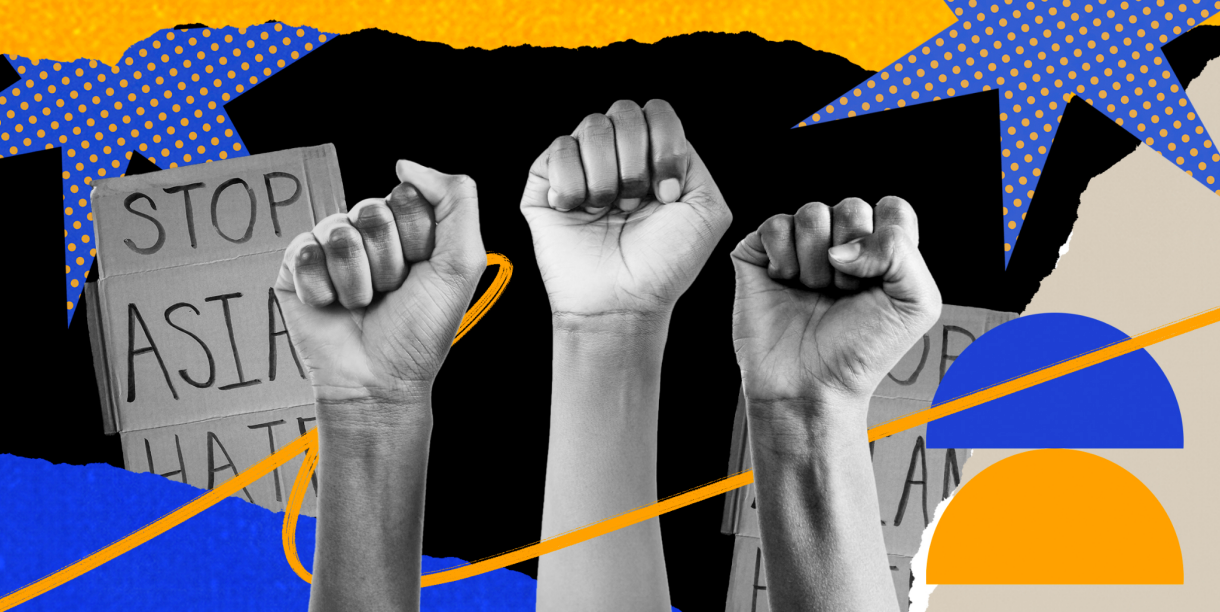Radical South Asian Solidarity Through Times of Crisis

We currently live in a world where racial, gender and class-based divisions reign over the ways society is shaped. Our history with organized and systematic oppression has not been eradicated in today’s world and has instead just taken new forms. Legacies of slavery and colonialism are still prevalent in the institutions we live in and the ways we are socialized to exist in this world. A region of the world that holds an especially nuanced form of power and privilege is South Asia. The region has a deep history with colonization by the British and as a result South Asians are an ethnic minority facing lasting impacts of this oppression that have only been exacerbated by the COVID-19 pandemic. In response, two radical South Asian advocacy organizations South Asian Americans Leading Together (SAALT) and Desis Rising Up and Moving (DRUM) have been created to achieve collective liberation for South Asians that are multiply marginalized across race, class and immigration status.
Nearly 5.4 million South Asians live in the US, the population tracing back to Afghanistan, Bangladesh, Bhutan, India, Nepal and the diaspora. SAALT is an organization that was conceived in response to 9/11 and the resulting islamophobia that ran rampant in the country (About SAALT, 2022). SAALT rose to meet the needs at that moment and helped to build community infrastructure for South Asians in order to have a network in place for people to organize, act, and advocate for themselves and their rights. Currently SAALT has been taking action to support the people devastated by the COVID-19 pandemic which has disproportionately affected Black and Brown populations across the country. The organization recognizes the need to resist institutionalized power that threatens the livelihoods and civil rights of people across the world. These insitutions include but are not limited to Islamophobia, the violence caused by Hindu nationalism, xenophobic political rhetoric, and white supremacy, which all continue to endanger the lives of South Asians both domestically and globally (About SAALT, 2022).
A significant population of South Asians live in NYC and DRUM is an organization that has risen up to support them. It supports low wage multi-generational South Asian and Indo-Caribbean immigrants leading social and policy changes. They work in solidarity, building with immigrant workers in NYC to create unity among communities fighting for human rights. DRUM confronts three crises in their work (DRUM, 2022). The first is a health crisis involving the lasting effects of COVID-19 on the poorest neighborhoods that also have a significant South Asian population. They also look at the systemic crisis that takes shape in our reliance on private corporations and their profit margins to determine education, housing, food, employment and every other system that makes up our society. Finally, they look at the social crisis that has ensued with the rise in anti-Asian sentiment and violence due to misdirected blame for COVID-19 (DRUM, 2022). According to a study conducted by the Center for the Study of Hate and Extremism, anti-Asian hate crime increased by 339 percent in the last year with cities like NYC reaching record highs (Kimmy Yam, 2022). DRUM recognizes these issues will prevent things from returning back to the way they were, but also believes in reshaping
the direction of society in a way that brings power back to the underprivileged for the decades to come. Their efforts involve a balance between providing information and connecting resources, creating social agitation and organizing around taking action and building solidarity through a shared culture.
The ways both SAALT and DRUM engage the communities they are supporting speak volumes to the way larger structures have failed to account for marginalized groups. These organizations have risen in response to South Asians feeling governmental policies are not meant to assist them and show the power in communities being able to create their own systems of care and assistance, especially in times of crisis.
Works cited:
About SAALT. SAALT. (n.d.). Retrieved March 26, 2022, from
https://saalt.org/about/about-saalt/
Power & Safety Campaign - Drum - Desis rising up & moving. DRUM.
(n.d.). Retrieved March 26, 2022, from https://www.drumnyc.org/powerandsafety/
TodayShow. (2021, May 25). What South Asian activists learned in the wake of
9/11, and how they're using it now. TODAY.com. Retrieved April 6, 2022, from
https://www.today.com/news/south-asian-activists-9-11-lessons-how-they-re-using-t217941
Yam, K. (2022, February 14). Anti-asian hate crimes increased 339 percent
nationwide last year, report says. NBCNews.com. Retrieved March 26, 2022, from
https://www.nbcnews.com/news/asian-america/anti-asian-hate-crimes-increased-339-percent-nationwide-last-year-repo-rcna14282



